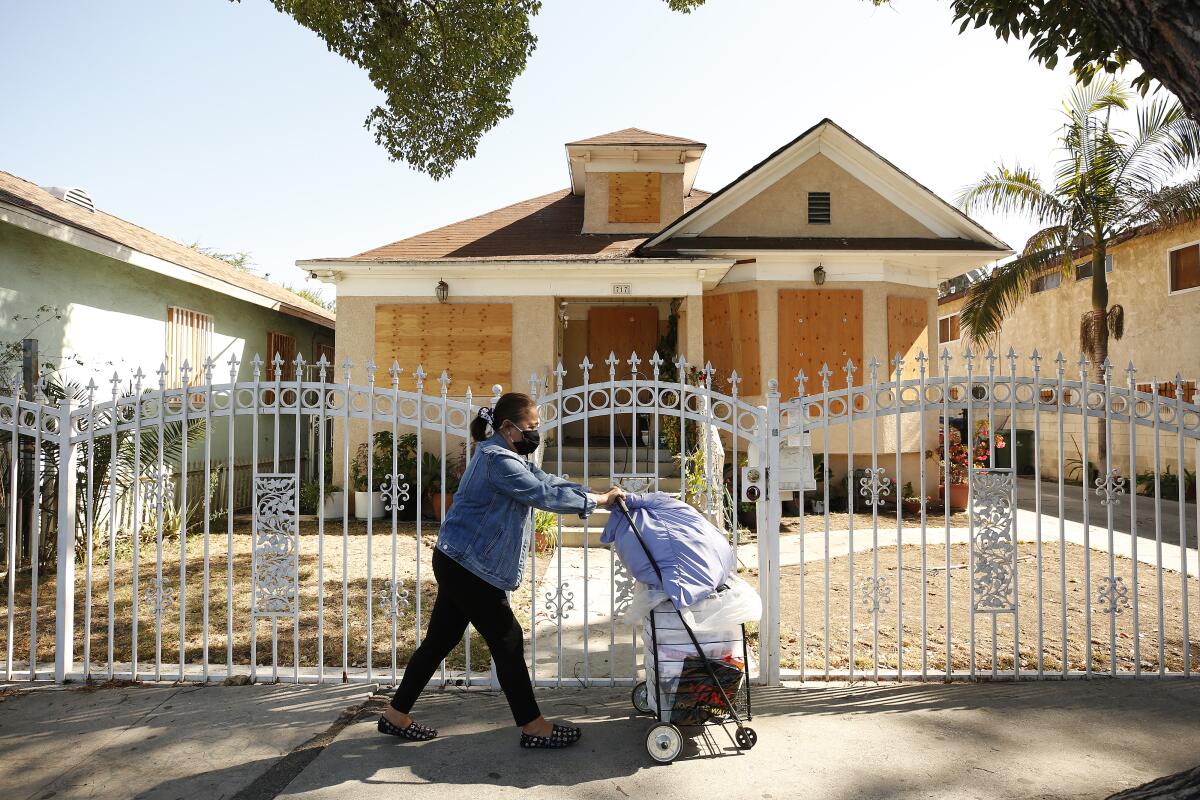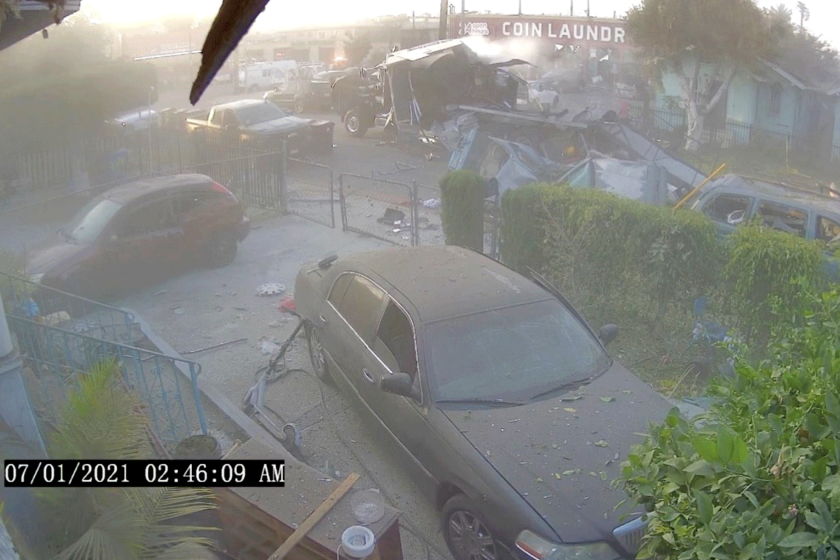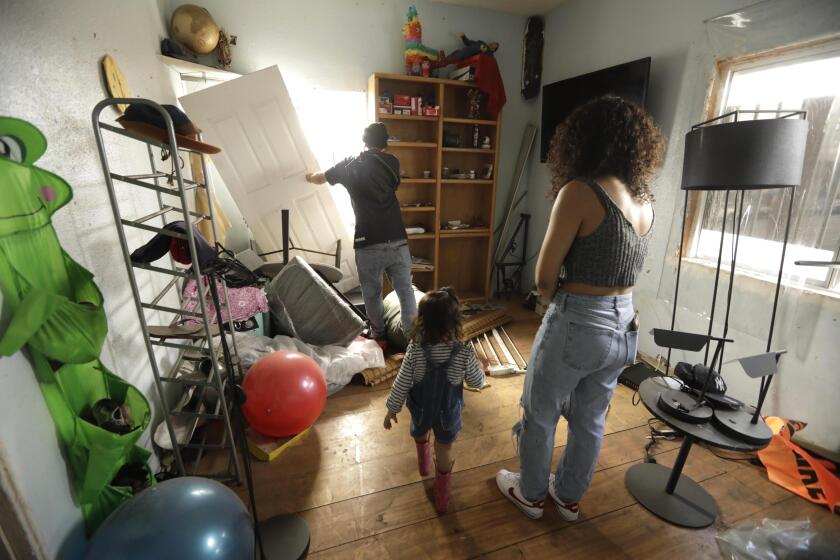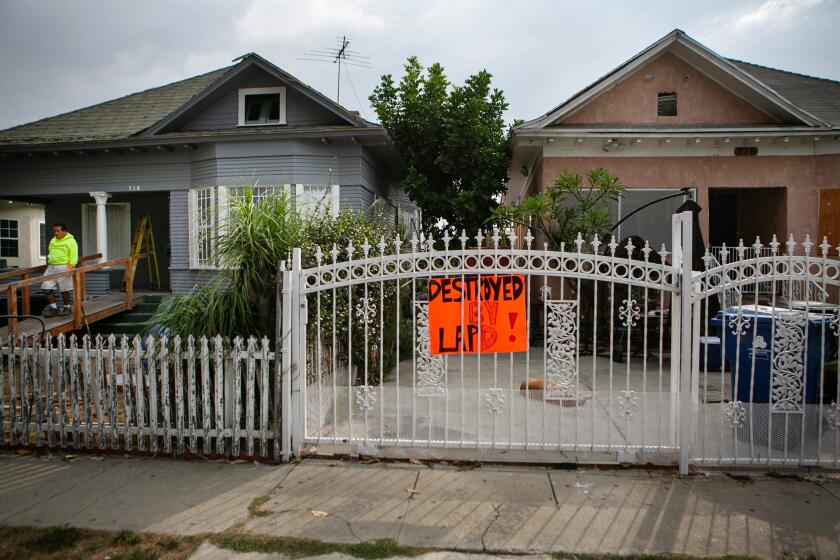Two years after LAPD fireworks explosion, residents are still trying to rebuild

- Share via
They gathered in the middle of East 27th Street, the spot where two years earlier — to the day — Los Angeles police botched the detonation of a cache of fireworks and blew up their lives.
Among the more than 30 attendees of this grim anniversary were displaced families still living in the Level Hotel downtown. Another that had only recently returned to a renovated home. One that had moved twice since the blast.
They gathered in South L.A., in the shadow of homes that remain uninhabitable, to speak about their lives — and their loss.
“They said it was going to be a short stay [in the hotel], but it’s been two years,” said Maria Velasquez, who rented a unit from her parents on the street before the explosion displaced them. “We’re not even close to coming home.”
Along with input collected by The Times from local residents, a report by the LAPD’s inspector general helps paint a picture of how guesswork and a laissez-faire management style led to what it calls a “catastrophic failure.”
It was June 30, 2021, that the Los Angeles Police Department bomb squad botched the detonation of a fireworks cache discovered in the backyard of a 27th Street resident. The resulting blast injured 17 people, damaged 35 properties and displaced more than 80 residents.
The hotel downtown was meant to be a place for families to stay until either their homes were repaired or they could find other affordable housing.
As of this week, 15 families were still living there.
The city, alongside partner agencies, nonprofit organizations and a relocation consultant, has assisted 12 renter households in moving out of the hotel and into permanent housing, according to a joint statement from Councilmember Curren Price’s office and the L.A. Housing Department. Another family has signed a lease and is in the process of moving out.
“The city remains relentlessly committed to working with each remaining household to provide relocation and assist them in getting their needs met,” the statement said.
A year after the LAPD blew up a South L.A. block with fireworks, 18 families are still living in a hotel, symbolizing failed city attempts to make them whole.
On Wednesday night, Price met with residents who expressed frustration over relocation services, the slow process to get their homes repaired and the possibility of getting kicked out of the hotel.
Ron Gochez of Unión del Barrio, which has helped organize community members affected by the blast, told Price they need to see work being done on homes on the street by Aug. 1, or residents will start protesting the city.
“I’m going to do everything I can for the residents on 27th Street,” said Price, who was recently charged with embezzlement, perjury and conflict of interest, all of which he denies.
The city has received 414 claims relating to the fireworks blast and has reached settlements in 154 of them. Payouts so far have totaled $1.48 million, according to the city attorney’s office.
Two people have been charged in relation to the case, including Arturo Ceja III, who lived on 27th Street. Ceja pleaded guilty in August 2021 in federal court to the unlicensed transport of explosives from Nevada to California.
Arturo Ceja III, 27, pleaded guilty to the unlicensed transport of explosives from Nevada to California. The LAPD’s bungled detonation of his cache blew up a neighborhood and injured 17 people.
Another man, Erik Ramos, pleaded guilty Monday to the same charge, according to the U.S. attorney’s office. In his plea agreement, Ramos admitted to transporting the fireworks along with Ceja. The agreement did not say where Ramos was living at the time.
In a statement over the weekend, the LAPD said four bomb squad personnel were disciplined based on their involvement in the blast. The department did not specify what that discipline was.
An unnamed officer was suspended for 10 days without pay as a result of the fireworks explosion, according to department records posted online in April. That was the first disciplinary action to come to light against an officer related to the disaster.
The department review led to new protocols for the bomb squad to prevent any similar events from happening in the future, according to the LAPD.
“Even our best intentions cannot take this neighborhood back to where it was before this event occurred,” LAPD Chief Michel Moore said in a statement. “However, as a Department, we remain committed to supporting the impacted residents as we continue to work to make this right.”
Nearly two years after the LAPD bomb squad blew up a South L.A. neighborhood during the botched detonation of a cache of fireworks, officials announced their first disciplinary action.
On Friday, residents of the neighborhood — some of whom hadn’t seen one another in months — caught up at tables set up in the street.
There were music and burgers, as well as piñatas — one of a police car and one of the “total containment vessel” the bomb squad used to detonate the fireworks.
“We’re here as a community to celebrate. Not to celebrate the explosion but to celebrate the people ... who have continued to be resilient, who have not given up, who have continued to organize,” Gochez said. “They’re not going to give up until they have justice.”
Among those in attendance was Juana Oceguera, who said she’d felt pressured to move out of the Level Hotel only months after the explosion.
Her family salvaged what little they could from their apartment and moved to Lancaster. But due to high rent and a lack of job opportunities, they recently moved back to L.A.
“Until this day, the explosion is affecting us,” Oceguera said.
More to Read
Sign up for Essential California
The most important California stories and recommendations in your inbox every morning.
You may occasionally receive promotional content from the Los Angeles Times.














